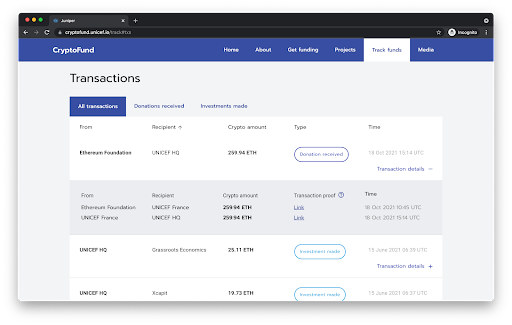Since 2019, we have been supporting The UNICEF CryptoFund with recurring contributions, and we are delighted to our most recent donation too. Today, I’d like to share the story of our journey together, recognize some of the accomplishments of our partnership, and talk a little more about what’s next.
Why and how we started
In a previous blog postI explained how emerging economies represent a huge opportunity for Ethereum, and talked about the importance of asking “Who would benefit most from Ethereum?”
People living in emerging economies represent billions of next-generation Ethereum users and developers. The next question should then be: “How can we reach the next billion? »
The Ethereum project started with a small group of people sharing a common mission. Today, the project has attracted hundreds of thousands of like-minded developers and researchers. This commonality of mind was the power that aligned the community, but we must recognize that it also created natural barriers to entry for those who had no connection to anyone in the community. For this reason, I have always been aware that the Ethereum community lacked the true diversity needed to maximize the technology’s real potential and reach the next billion.
Towards the end of 2018, I was looking for opportunities to expand our reach when I met Chris Fabian of UNICEF Ventures (who now leads the Gigaprojectwhich we also support). To be honest, before our first meeting I had doubts about whether EF would work well with a UN team. I had the impression that it was a large, very traditional organization with conventional ways of doing things. But Chris shared some lists of goals they wanted to achieve using blockchain technology, and it blew me away.
He and his team understood the importance of public blockchains, as well as the tradeoffs of different protocols. It was at that moment that I became certain that there was an opportunity for both groups to form an impactful partnership. UNICEF has a network and resources that we did not have, with work underway in more than 190 countries and collaboration with diverse stakeholders, including NGOs, businesses, startups and governments. They were also looking for new ways to change from within and embrace innovation. This is how our collaboration began, and from there we started supporting the UNICEF CryptoFund, which was announced and launched at Devcon 5 in October 2019.

Chris Fabian and I at Devcon 5, which coincided with Halloween. The UNICEF Ventures team spent a sleepless night coordinating with headquarters the launch of the CryptoFund.
UNICEF Crypto Fund
It was natural for FE to become the founding donor of the UNICEF CryptoFund given our collaboration. The CryptoFund is the first vehicle in the entire United Nations ecosystem – and perhaps the public sector as a whole – to receive, hold and use cryptocurrencies, and it invests in supporting technology startups from developing countries that aim to improve the lives of children. . These startups receive tokens and use them without converting them into fiat currency, with the aim of developing open source digital public goods. To date, 2,527 ETH and 8 BTC have been contributed and 18 investments have been made.
At the same time, the CryptoFund attempts to address a major challenge for organizations like UNICEF: that of transparency and accountability. Traditionally, donors and other stakeholders have not had access to a real-time, tamper-proof view of how a charity is spending its money. In the case of the CryptoFund, each transaction carried out by the CryptoFund is visible on his website with a corresponding link containing immutable transaction details on blockchain explorers.

In the image above you can see the most recent EF donation – first received by UNICEF France and then transferred to UNICEF headquarters.
The CryptoFund website is powered by Junipera set of open source tools developed by UNICEF Ventures to help manage digital assets. Any public sector organization interested in leveraging tokens in a user-friendly and transparent way can experiment with Juniper today.
Many of the 18 startups that received CryptoFund investment also use blockchain-based technology in their products, and we will continue to support them through workshops and by connecting them with wonderful talent and projects in the Ethereum ecosystem . You can learn more about these startups developing open source digital public goods here.
I cannot overstate the influence of this project – not only for the humanitarian sector and governments, but even for the entire world. It raised awareness and allowed the public to see how it is possible for a large, established international organization to adopt public blockchains in an efficient and transparent manner. I have heard so much positive feedback and I sincerely hope that other traditional organizations like UNICEF will feel more confident using these public goods as well.
What’s next?
As we continue our support of the CryptoFund and its portfolio companies developing digital public goods in emerging economies, EF’s collaboration with UNICEF is evolving. Thanks to the new EF Scholarship Programwe support two exciting developments. An EF Fellow – who represents a CryptoFund portfolio company – is working with many national and municipal governments in Latin America to use blockchain in digital identity and verifiable credentials. Another EF Fellow explores the intersection of internet connectivity and blockchain, working with Giga, a joint initiative of UNICEF and the International Telecommunications Union (ITU) to bring internet to every school around the world .
I’m excited to share more about their work in the months to come and look forward to expanding our reach to the next billion through our continued partnership with UNICEF. In the meantime, you can find them on Twitter: UNICEF Innovation (which manages the CryptoFund), UNICEF France (which was the first national committee to use cryptography), and Giga.

Finally, I would like to extend my deepest gratitude to Sunita Grote, who leads the UNICEF Risk Fund, Christina Rose Lomazzo, UNICEF Blockchain Lead (as well as Mehran Hydary, Cecilia Chapiro and d others who have been part of the journey together), and to Chris Fabian, for pushing things together for these milestones.




